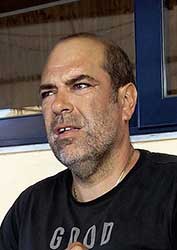«Our company will advance after the summer in the herbal packaging and distillation of essential oils as well as in the olive oil packing plant,» Manolis Fasoulakis, owner of the agricultural company, said in an interview to «In-On» magazine.
Question: How many kinds of herbs are produced?
Answer: The species of herbs are nine and they are the following: oregano (The Greek oregano is a plant and it is considered one of the best in the world.) The oregano apart from its use in the food, it also has medicinal properties (the main property -known pharmaceutical- is the active substance called carvacrol). Dittany of Crete (Dittany is an endemic plant and its name comes from Mount Dikti in Lasithiota). In Minoan Crete and Ancient Greece it was considered to be one of the most important medicinal plants. Hippocrates used it to cure stomach and digestive disorders, rheumatism, arthritis, as a healing substance, for menopause, as a tonic and antispasmodic medicine. Marjoram (Marjoram is a plant relative to oregano. In Greece the marjoram is known since ancient years when it was used as a medicine against stomach and intestinal discomfort). Thyme (Thyme is one of the essential ingredients of Benedictine Liqueur. The main ingredient of the 20-54% thyme essential oil is called thymol or in other words camphor of thyme and it is used in perfumery and dentistry. The beverage from Thyme can be used to treat cough and bronchitis). The lemon thyme (lemon-thyme has larger leaves than the common thyme, they are not curved inwards and it is a variety of T. Serpyllum). Mint (Mint is a medicinal plant used in cooking as a seasoning, as a herb tea or essential oil). Lavender (The essential oil of lavender containing in its leaves is used in perfumery and for the treatment of neuralgia. It also has antiseptic properties and is used in the healing of injuries. In large doses lavender acts as a hypnotic and narcotic). Rosemary (Ancient Greeks used rosemary in various religious ceremonies and celebrations, in building decorations, temple decorations and as fuel for incense.)
From the leaves of rosemary a liquid is extracted which is used in the preparation of a medicine for rheumatism, for various mouth irritations as well as in cough. From its stems an essential oil is extracted used in perfumery, in soap making, as well as through proper processing in the manufacture of insecticides). Sage ( sage – or Salvia officinalis is a medicinal plant found in all areas of Greece, mainly in dry and rocky places. According to recent research, its use has a positive effect on the treatment of Alzheimer’s and Hyperlipidemia.
Question: Where are these products sold in Greece and abroad?
Answer: As far as Greece is concerned, they are sold in the market of Crete and since August 2017, there is interest in other regions of the country as well as abroad. Regarding abroad, there is interest in the countries of the USA, Germany, Japan and Dubai.
Question: What other products does the company produce?
Answer: We produce conventional olive oil and honey. It has to be noted that our olive oil is organic but there is no certified organic factory in the area of Sfakia. In order to get organic certification, we must travel over 40 kilometers each day, which is impossible. As a result, our products can not be sold as organic.
Question: Tell us about the history of the company?
Answer: Four years ago, after a market survey, I ended up on herbs because no chemicals are needed and the area has great potentials for large productions due to the high temperature since the sunshine gives the herb a better quality. Also soil conditions are ideal. The herbs grow in dry and sunny areas where vegetation is limited. In prospect, we are targeting at a packaging processor for the herbs and a distillation of essential oils as well as an olive oil packaging plant.
After the herbs having passed the three-year transition period since December 12, 2017 they will be called officially organic.
The product certification company is IRIS.
CURRICULUM VITAE
Manolis Fasoulakis was born in 1974 in Chora of Sfakia. He studied Hotel Management at the ZETA School in Chania. At the same time, he was involved with his family tavern and also tourism. He then decided to be involved with the agricultural sector.

